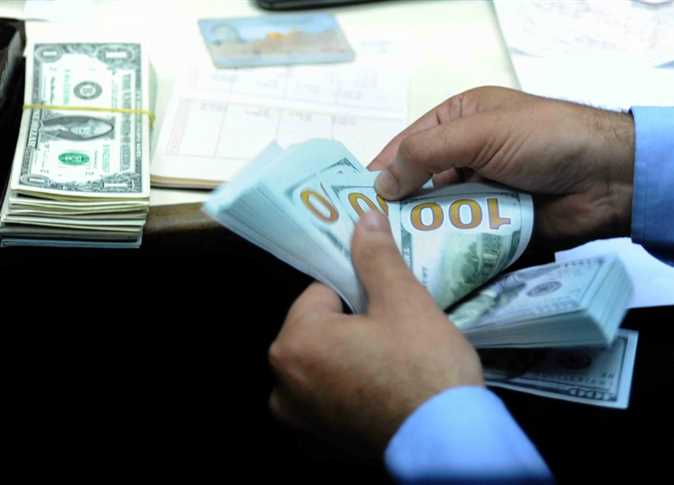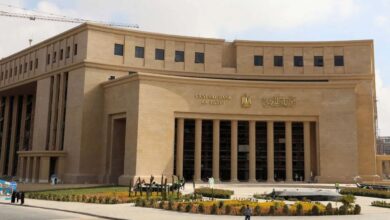On Sunday, Ahmed Khalil stood monitoring the exchange prices of currencies at an exchange office in Giza.
He was planning to make a quick buck on the falling price of the Egyptian pound.
“How much is the dollar today? LE6.49? Did the Central Bank say this is the official price of the dollar today? That currency exchange offices will reduce their prices?”
“How strange. The black market must have been a better place to go the past few days — I could have made money if I had converted the dollars I have to Egyptian pounds,” he ponders out loud.
Khalil, and many other Egyptians, have attempted to make the best of the pound losing value against the US dollar by playing the currency exchange market.
In the past few weeks, these citizens have turned into speculators. On 27 December, the pound-dollar exchange rate was LE6.18 to the dollar. Three days later, it was LE6.3. By 1 January, it hit LE6.51.
The currency’s fall has so far been carefully managed by the Central Bank of Egypt, which is no longer able to sustain a policy of propping up the pound by selling off US dollars, due to its dwindling foreign reserves. The Central Bank has spent an estimated US$20 billion of the country’s foreign reserves, bolstering the pound’s value over the past two years.
The remaining $15.02 billion will be rationed for bank use and imports, officials say.
The pound has also fallen, many experts also say, upon the recommendation of the International Monetary Fund, whose officials have been visiting the country to consult on economic policy in preparation for a $4.8 billion loan.
The unstable pound-dollar exchange rate has led the Central Bank to undertake certain procedures to reduce speculation.
Cautionary procedures
Among the set of procedures imposed by the Central Bank are imposing a $30,000 ceiling on daily company withdrawals and preventing travelers from entering or leaving the country with more than $10,000.
In addition, the Central Bank has been conducting foreign exchange auctions since last week, whereby the banks bid for the necessary amount of dollars needed for their operation. The Central Bank also imposed a 2 percent commission on all currency transactions for individuals and a 1 percent commission for the same transaction for companies.
Currency exchange workers see these measures as having a different goal than hampering speculation, though. This last measure of a commission at banks, they say, means that most citizens will head to one of the country’s numerous small currency exchange offices for their dollar-pound and pound-dollar transactions.
In a series of interviews with currency exchange office workers, Egypt Independent found that several see the Central Bank’s most recent measures, particularly the 2 percent bank commission, as having another, concurrent goal, which aligns with its long-term monetary policy.
They say that by pushing currency transactions to the more unofficial currency exchange sphere, where exchange rates often fluctuate outside the official rate, the Central Bank is both attempting to draw existing dollars out of the economy and fielding a test balloon to determine the pound’s real floating value.
They say the Central Bank intends to let the pound’s value float at exchange offices, with the view of executing a long-term, managed devaluation that would be approximate to floating the pound. The IMF had earlier announced that it supports a managed devaluation of the pound that would align it closer to its real market value.
Hamed, executive director of an exchange office who declined to give his family name or the name of the office he manages, says he believes the Central Bank has a plan that includes several steps to reach a certain exchange rate that serves the government’s plan for systematic devaluation of the pound.
“Since the new procedures were announced, it was natural for people to go to exchange offices because they give prices lower than banks — and without the commission,” he says. “As exchange offices, we seized the opportunity to increase prices after demand for the dollar increased. As soon as the people heard that the price of the dollar was rising, they withdrew the bank deposits, bank certificates they have in Egyptian pounds and came to convert them into dollars.”
Besides banks, exchange offices are the only entities that have the legal right to buy and sell dollars. Since Central Bank Governor Farouk al-Oqda took office in 2004, all currency exchange offices were obliged to sign contracts with banks from which they would obtain dollars under the supervision of the Central Bank.
The goal of the procedure was to crack down on the black market that was running rampant at the time.
But in recent weeks, currency exchange offices have not been able to purchase dollars from banks, which meant that the only way for exchange offices to get dollars was through speculative transactions with individuals and companies.
Hamed adds that currency exchange offices have made some serious gains due to the situation. He says usually, the exchange office makes a margin of profit of LE0.02, but that margin has risen to LE0.15 in the past week.
“For instance, in the conversion of $100,000 to pounds, we used to make LE500, while over the past days we’ve made LE10,000 in the same transaction,” he says.
By the end of last week, the price of the dollar rose to LE6.48 at most exchange offices, but since banks close Fridays and Saturdays, while exchange offices remain open, the exchange price there rose to an unofficial LE6.7 Saturday afternoon, fueling further speculation.
On 2 January, to keep the unofficial rate from going any higher, the Central Bank decided to reduce the commission for dollar conversions for individuals from 2 percent to 1 percent.
Hamed adds that this measure has prompted many individuals to opt for banks to again exchange dollars, which is the intention of the Central Bank.
He says the bank wanted individuals to resort to exchange offices in the first week, in order to draw dollars out of the local economy through speculation, to save the bank from having to spend more of its precious foreign reserves.
Thanks to this move, the pound gained on the dollar, with rates lowering from LE6.70 to LE6.49, he says.
“As workers in the field of currency exchange, we see that the bank has undertaken these [latest] measures in order for the dollar to stabilize vis-a-vis the pound, in order for the prices of commodities not to rise,” he says. “But on the other hand, it wanted to allow the dollar to rise vis-a-vis the pound within the framework of a plan to systematically allow the pound to float.”
Official discourse
But the theories about other Central Bank motivations remain merely theories. Most currency exchange officer workers with whom Egypt Independent spoke declined to give their full names or places of work for publication.
And banking and exchange officials are either dismissive of the conjectures or, expectedly, ambiguous on the subject.
“There are two contradictory economic theories that explain the current situation,” says Mohamed al-Abyad, chairman of the exchange sector at the Cairo Chamber of Commerce. “But any economic situation is subject to several interpretations. The bottom line is whether or not we resolve the crisis.”
Mohamed Abbas Fayed, vice president of Banque Misr, rejected the theory propagated in currency exchange circles about the Central Bank’s recently adopted measures.
“Foreign currency reserves have dropped to a critically low level and the Central Bank cannot withdraw any more from it,” he says. “The current reserves are only sufficient to cover imports, including of strategic commodities such as food and fuel whose prices have internationally increased by 30 to 40 percent. Meanwhile, the domestic product has dropped due to the decline in tourism and investments, and so the [bank] had to undertake those procedures which do not have a direct relationship with floatation.”
He also denies that the devaluation was directly brought on by the IMF negotiations.
“The IMF has not asked for the pound to be allowed to float. It has asked for reducing the budget deficit from 13 percent to 8.5 percent as part of a clear economic plan,” he says.
Fayed says currency exchange office employees were not qualified to give an advised opinion, because they are influenced by their business interests, which benefit from an unstable exchange rate.
“The Central Bank’s goal was to stop speculation temporarily and so it had to control the availability of the dollar using mechanisms it determined,” he says.
This article was translated by Dina Zafer.
This piece was originally published in Egypt Independent's weekly print edition.



